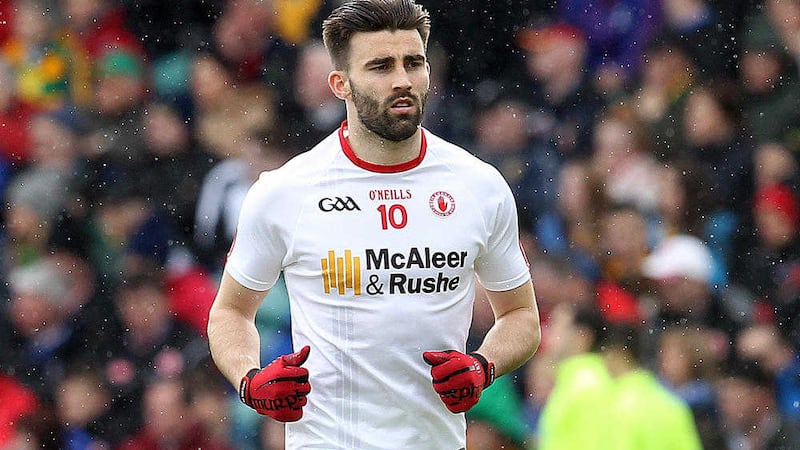EVERY year, there seems to be controversy surrounding the GAA’s disciplinary system. The two big issues are the use of video evidence to suspend players and the limitations of the appeal system.
I’ll be up front with my own biased views on post-game suspensions. I always felt Tyrone were treated more harshly than other teams during my playing days. I knew our players were guilty of offences that deserved punishments, but it seemed to us that others were ignored. Looking back now, I’d still say we were treated differently, but it is something you have to accept with being one of the top teams.
It’s the same in every sport – controversial incidents involving the best teams make more headlines and put the authorities under pressure to take action. Tyrone players spent a number of late nights in Croke Park having their appeals heard. Virtually every county has gone down this route knowing their players were guilty.
What it has shown is the weaknesses within the current disciplinary system. We should not have players getting off on technicalities.
I would love to see the GAA admit the system is not working and use the same legal people involved in the appeals process to tighten up the current system. All players really want is a disciplinary system that is fair and transparent – everyone should be treated the same.
There was one incident in particular that sticks in my mind from my playing days. From then on, the Tyrone players would have been of the opinion that different rules applied to us. Twelve years later, that belief has never gone away.
Gavin Devlin got a three-month ban in 2003 after the National Football League final, despite receiving a yellow card during the game. The general rule was incidents dealt with by the referee during the game would not be reviewed. At the time, it seemed to me it was a case of one set of rules for Tyrone and one set for everyone else.
Within the space of a few weeks this year, we had several examples of the flawed system in operation. Tiernán McCann’s eight-week suspension for diving highlighted how the media influenced the CCCC, ignoring the rule in place to get the result they wanted. On the same night as McCann had his suspension overturned, Mayo’s Kevin Keane had his ban for striking overturned, even though he clearly struck Michael Murphy.
Philly McMahon escaped sanction for a clear headbutt in Dublin’s semi-final against Mayo and Diarmuid Connolly successfully appealed his ban for striking Lee Keegan. I wouldn’t criticise Keane and Connolly for appealing, but it is wrong that guilty players are able to get off. The appeal system should be there for players who have been harshly treated.
We do not want referees to be constantly undermined by reversing their decisions. However, at present, their correct decisions are sometimes ‘wrong’ in the eyes of the disciplinary bodies. A more simplified rulebook and disciplinary system would certainly help. The onus, though, is on players and management teams to accept the punishments handed out.
An appeals culture has developed within the sport and it does nobody any favours. Football is considered a manly game, tough and physical. We need players to be manly enough to accept the punishments handed out to them.
Referees have a virtually impossible job at present. The dramatic increase in the pace of our games, as well as the ever-changing rules, have put even more pressure on the officials. I’m sure a lot of referees who encountered me on the pitch would have appreciated a similar understanding of their task during my playing days. They are criticised for any mistakes they make or incidents they miss but, in truth, there is so much going on they will never get all of the major decisions right.
We should learn from other sports. Rugby league referees can put incidents on report, allowing the disciplinary body to review them to see if they took the right action.
We have a referee, two linesmen and a fourth official who could be given the power to put incidents on report. It would help do away with the notion certain teams are victimised and allow everyone to be treated fairly.
Rugby union has a citing procedure where opposition teams or an independent person can identify incidents. I don’t believe citing from opposition teams would be effective as there is a culture within the GAA to leave things behind on the pitch. There is no doubt that culture may be getting slightly eroded as the ‘win at all costs’ mentality grows, but it is still prevalent.
Players do not want to get others suspended. After the 2005 Ulster final replay between Tyrone and Armagh, Ryan McMenamin and Paul McGrane were suspended for separate incidents during the game. John McEntee had agreed to write a letter of support for ‘Ricey’ in his appeal hearing and I was asked to do the same for Paul.
Paul had caught me with a blow which left me concussed and unable to remember 15 minutes of the match. However, I was willing to sign a statement in support of him as none of us wanted to see players suspended after the game. We were happy to move on and concentrate on the next match. Citing by an independent person would be the ideal situation.
The issue is whether we have the resources to ensure this happens at every county match. Wexford v Louth should be no different to Kerry v Cork. We need to look at the possibility as it is the only way of ensuring consistency.
By tightening up the rulebook, as well as introducing a report/citing system, the onus will be put firmly on players to take responsibility for their own actions. Whether they are willing to step up to the mark is an all-together different question. However, they won’t be able to deflect attention elsewhere.






